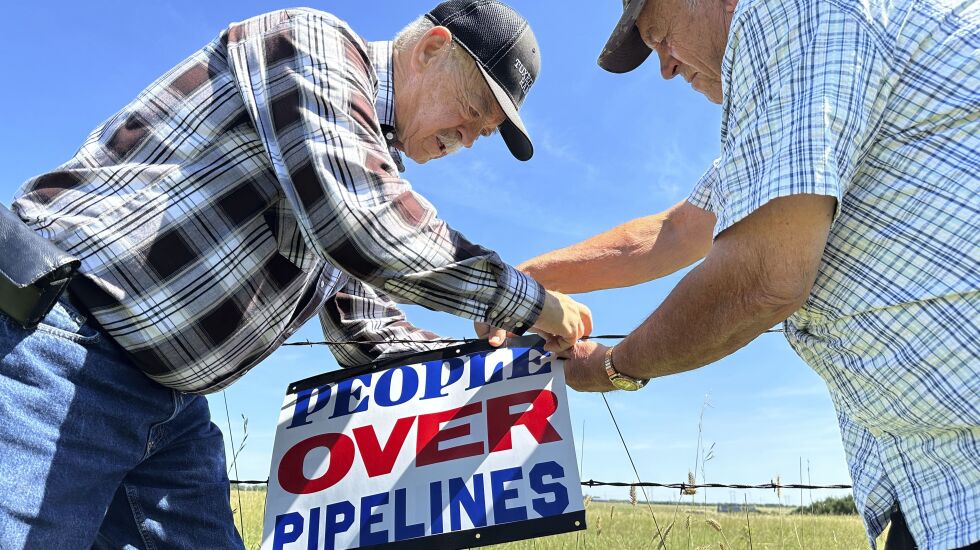
Illinois is home to a bustling agriculture industry — one that drives our state’s manufacturing jobs. Local farmers grow corn and soybeans, and our proud union workers build and operate the facilities that transform those crops into food, fuel and countless other products. It’s a relationship that powers our state’s economy and growth.
We now have an exciting opportunity to grow our agriculture and manufacturing sectors even more. Globally, nationally and locally here in Illinois, companies and consumers alike are taking steps to reduce their carbon footprints. The state’s agricultural supply chain stands ready to respond to these demands while also creating good-paying jobs for Illinois’ union workers, including the International Brotherhood of Teamsters, the International Union of Operating Engineers, the Laborers’ International Union of North America and the United Association of Union Plumbers and Pipefitters.
A key component of this opportunity is carbon capture and storage, or “CCS” for short. It’s a pretty straightforward concept for our region: capture carbon dioxide, or CO2, that would otherwise be emitted into the atmosphere, safely transport it via pipeline, and permanently store it deep underground in a sandstone formation. This undertaking meets consumer demands for low-carbon products, ensures our manufacturing sector remains competitive and creates a sustainable future for our members and Illinois at large.
But CCS is not without its detractors. They raise concerns about safety and regulatory oversight. As the four unions who are responsible for constructing critical infrastructure projects such as Wolf Carbon Solutions’ Mt. Simon Hub, we believe it’s important to address these worries head-on.
Safety is paramount
First, the proposed pipeline is designed with rigorous safety measures in place to ensure safe operation. Union members, including pipefitters, equipment operators, laborers, truck drivers and more will bring our extensive training, professionalism and dedication to safety to the task of building the pipeline. Thanks to our gold-standard registered apprenticeship programs, these members are the best-trained and most highly skilled craftspeople in the industry. Claiming that this pipeline will be dangerous is, we think, questioning by extension the integrity of our members’ commitment to the safety of co-workers and communities in which we build projects. Nothing is more important to us than the safety of our people on the job and the communities where their families live.
Second, there is extensive regulatory oversight for this pipeline, chiefly by the U.S. Department of Transportation’s Pipeline and Hazardous Materials Safety Administration. This federal agency oversees more than 5,000 miles of CO2 pipelines carrying 68 million tons of CO2 each year. Their regulatory authority includes detailed requirements for construction, regular inspections and maintenance, pipeline monitoring, and in the unlikely event of an incident, a thorough and effective response plan.
Additionally, both the U.S. Department of Energy and the Illinois State Geological Survey acknowledge that CO2 can be safely and permanently stored beneath the earth’s surface, and the Illinois Department of Agriculture administers depth of cover and restoration requirements to ensure that Illinois agricultural producers can continue to feed and fuel the world. And to top it all off, the U.S. Environmental Protection Agency sets strict scientific, technical, and environmental requirements for CCS projects.
Low incident rate for decades
Illinois already has a successful track record with carbon capture technology. ADM has been safely operating a CO2 storage site in Decatur for 10 years without incident. Nationwide, CO2 pipelines have been built and mostly safely operated for more than four decades, boasting an incident rate lower than other pipeline types.
Ultimately, CCS is a proven, extensively employed and safe technology. If we hesitate to capitalize on this opportunity, other states won’t, putting at risk the jobs that could have been anchored right here in Illinois.
The state’s agriculture and manufacturing industries underpin farming communities, nurture local economies and provide secure, family-sustaining jobs. As Illinois workers, our unions recognize CCS as a way to not only bolster — but also future-proof — Illinois’ agriculture and manufacturing jobs.
Sean M. O’Brien is the general president of the International Brotherhood of Teamsters. James T. Callahan is general president of the International Union of Operating Engineers. Brent Booker is general president of the Laborers’ International Union of North America. Mark McManus is general president of the United Association of Journeymen and Apprentices of the Plumbing and Pipe Fitting Industry.
To submit a letter to the editor or op-ed, check out our guidelines.
The views and opinions expressed by contributors are their own and do not necessarily reflect those of the Chicago Sun-Times or any of its affiliates.







